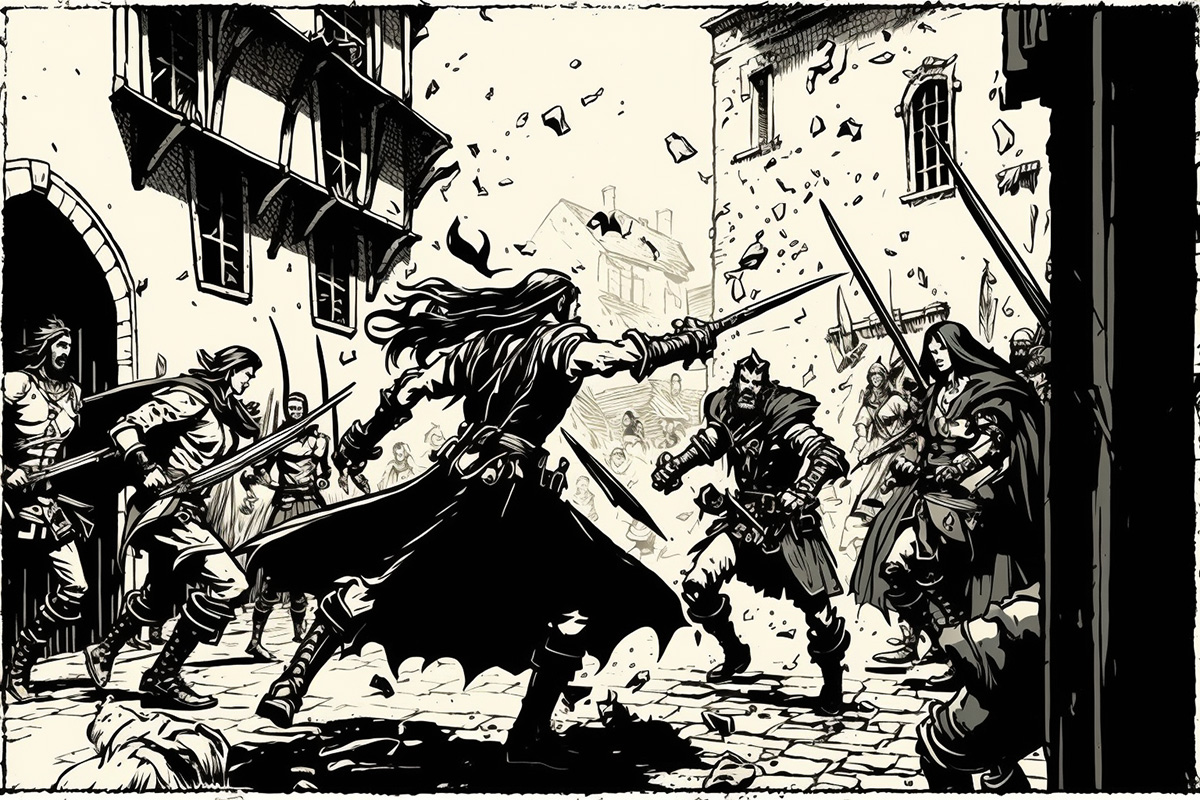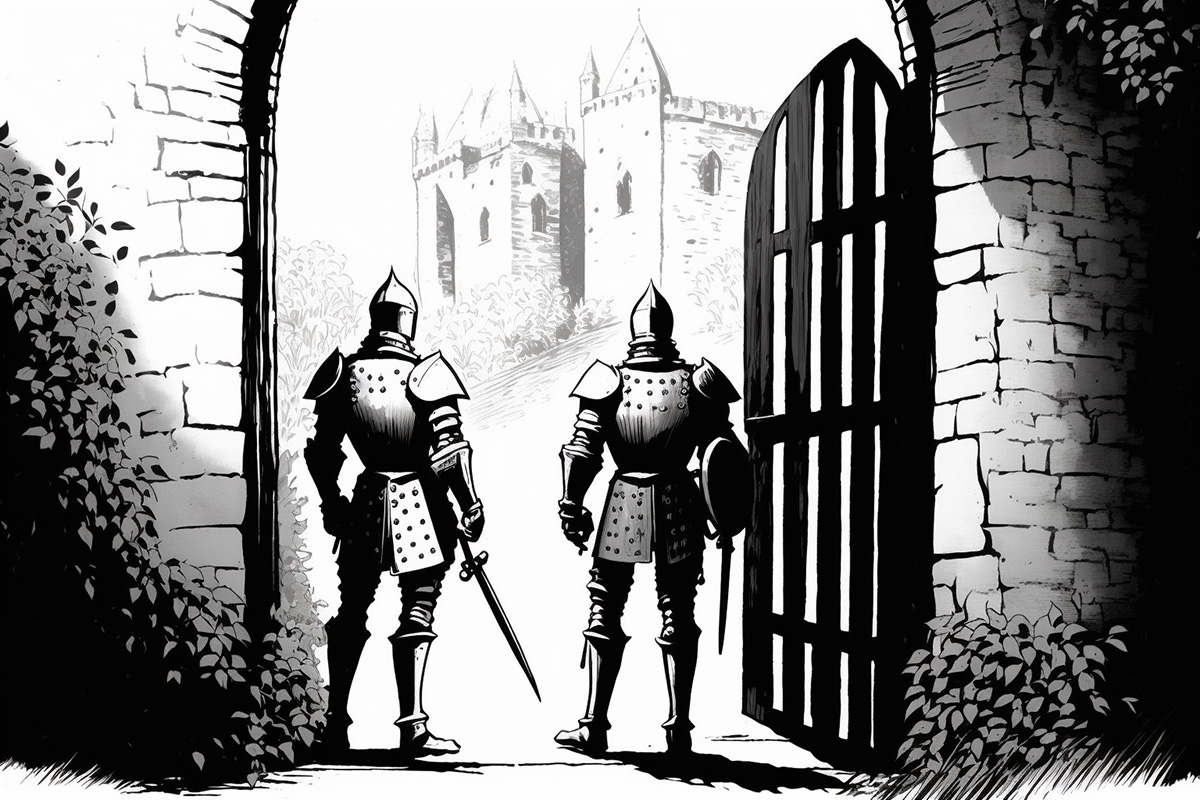The Alert feat represents a character’s heightened instincts, quick reflexes, and ability to remain vigilant in dangerous situations. If you want to ensure you’re always prepared for the unexpected and want to act quickly in combat – then read on!
Table of Contents
What does the Alert feat do?
The Alert feat provides three primary benefits to characters who choose to take it:
- +5 bonus to initiative: With the Alert feat, your character becomes quicker to react in combat situations. This increased speed allows you to act earlier in the initiative order, giving you an edge over your enemies and providing more tactical options.
- Cannot be surprised while conscious: The Alert feat ensures that your character is always on guard, even when others might be caught off-guard. As long as your character is conscious, they cannot be surprised. This benefit can prevent ambushes or other sudden attacks from catching you unaware, allowing you to act during the surprise round.
- Hidden attackers don’t gain advantage on attack rolls: When an attacker is hidden or unseen, they typically gain advantage on their attack rolls against a target. However, with the Alert feat, your character’s heightened senses and awareness make it difficult for hidden attackers to gain the upper hand. As a result, they do not receive advantage on their attack rolls against you. This benefit can be especially useful in encounters where enemies rely on stealth or invisibility to gain an advantage in combat.
How does the alert feat work?
The effects of the Alert feat are passive, meaning you don’t need to “do” anything to use them, but these are the kind of situational benefits you’ll get:
- Ambush: Imagine your party is travelling through a dense forest when suddenly, a group of bandits attempts to ambush you! Thanks to your Alert feat, you cannot be surprised and are able to act during the surprise round, potentially attacking or warning your allies before the bandits can strike. Someone has definitely Prestidigitation-flavoured food!
- Invisible attacker: In a tense combat encounter, an enemy spellcaster casts Invisibility on themselves and moves to a new position. While your allies may struggle to defend against the unseen threat, your Alert feat prevents the invisible attacker from gaining advantage on their attack rolls against you, making it harder for them to land a hit.
- Fast reaction in combat: During an intense battle, your high initiative bonus from the Alert feat allows you to act before a powerful enemy can use a devastating ability. This extra speed gives you the opportunity to interrupt their plans, protect your allies, or eliminate the threat before it can cause significant harm.
Does Alert affect passive perception?
No, the Alert feat does not directly affect your character’s passive perception. It provides benefits related to initiative, surprise, and hidden attackers, but does not grant any bonus to your character’s Perception skill or passive perception score. However, even though Alert does not directly improve your passive perception, it can still help your character be more aware of their surroundings and better prepared for danger.
Does Alert negate sneak attack?
The Alert feat provides some protection against the conditions that might grant a Rogue the opportunity to perform a sneak attack but does not completely negate sneak attacks or outright prevent the additional damage from being applied.
For instance, the Alert feat prevents hidden attackers from gaining advantage on their attack rolls against your character. This can make it more difficult for a Rogue to gain advantage through stealth, but it does not prevent them from gaining advantage through other means, such as flanking (if using the optional rule) or the use of spells such as Shadow Blade (when in a low-lit area) or Faerie Fire.
Additionally, by acting earlier in the initiative order, your character may be able to interrupt the Rogue’s plans or force them into a less advantageous position. While this does not guarantee protection against sneak attacks, it does make it more challenging for the Rogue to successfully execute one against your character.

How to use the Alert feat effectively
What are the best classes for the Alert feat?
While any character can benefit from the Alert feat, certain classes may find it particularly useful:
- Rogues: The increased initiative helps them act first and utilise their sneak attack before enemies can react.
- Spellcasters: Early turns in combat allow them to control the battlefield with spells, potentially disabling enemies, casting buffs or otherwise creating advantageous situations for their allies.
- Frontline fighters: Acting early can enable them to position themselves between enemies and more vulnerable party members (aka meatshield), protecting their allies from harm.
Combining the Alert feat with other abilities or class features
To maximise the effectiveness of the Alert feat, consider combining it with other abilities or class features that synergise well with its benefits:
- Evasion (Rogue, Monk): Acting early in combat can help you move out of the area of effect of spells or abilities before they are triggered, making the most of your Evasion feature.
- Sentinel (Feat): With the Alert feat, you’ll often act before your enemies, allowing you to position yourself to effectively use the Sentinel feat and control enemy movement.
- War Caster (Feat): As a spellcaster, acting early in combat enables you to place concentration spells on enemies or allies. Combining this with the War Caster feat makes it harder for enemies to break your concentration, ensuring your spells have a lasting impact.
Tactical considerations of Alert feat during combat
When using the Alert feat, consider the following tactical tips to help you make the most of its benefits:
- Positioning: Use your increased initiative to move into advantageous positions on the battlefield, whether that means protecting your allies, engaging enemies in melee, or finding cover for ranged attacks.
- Control and debuff: As a spellcaster, use your early turn to apply crowd control or debuff spells to your enemies, potentially hindering their actions before they have a chance to act.
- Communication: Alert characters can act as scouts or sentries, warning the party of impending danger. Use your heightened awareness to communicate with your party members and plan coordinated strategies to overcome challenges.
Roleplaying with the Alert feat
Incorporating the Alert feat into your character’s backstory
When choosing the Alert feat for your character, consider how their heightened senses and quick reflexes developed. This can help to enrich your character’s backstory and make their abilities feel more grounded in the narrative. Some possible explanations for the Alert feat could include:
- Military training: Your character may have undergone rigorous training in the military, learning to remain constantly vigilant and prepared for danger.
- Survivor of a traumatic event: A traumatic event in your character’s past could have left them perpetually on edge, with their heightened senses serving as a coping mechanism.
- Natural talent: Your character might have been born with exceptional instincts and reflexes, honing their abilities over time through practice or training.

Suggestions for roleplaying a highly alert character
Weaving in feats such as Alert intro the fabric of your character can be a great way to add flavour. Here are a few suggestions for incorporating the feat into your roleplaying:
- Describe your character’s heightened awareness: When entering new locations or engaging in conversations, describe how your character is always scanning their surroundings, listening for unusual sounds, or keeping an eye on potential threats.
- Act cautiously: Your character’s heightened senses may make them more cautious or even paranoid. Consider how this might affect their interactions with others and their approach to problem-solving.
- Develop quirks or habits: Give your character specific habits or quirks related to their alertness, such as constantly fidgeting, frequently checking their equipment, or being unable to sit with their back to a door.
Should I take Alert feat?
You shouldn’t be surprised (especially if are Alert, haw haw), that ultimately, the decision to take the Alert feat should be based on your preferences, your character’s story, and how you envision their growth throughout the campaign. Experiment with different options, and don’t be afraid to try new feats and combinations to create a character that is truly unique and exciting to play.
However, if you’re not opting for an ability score increase and your character’s role involves reacting quickly in combat, taking on a protective role for the party, or if you enjoy a tactical and strategic approach to encounters, then the Alert feat is well worth considering. Additionally, if you relish the opportunity to roleplay a character with heightened senses and instincts, I’ve always found the Alert feat particularly fun to roleplay.
